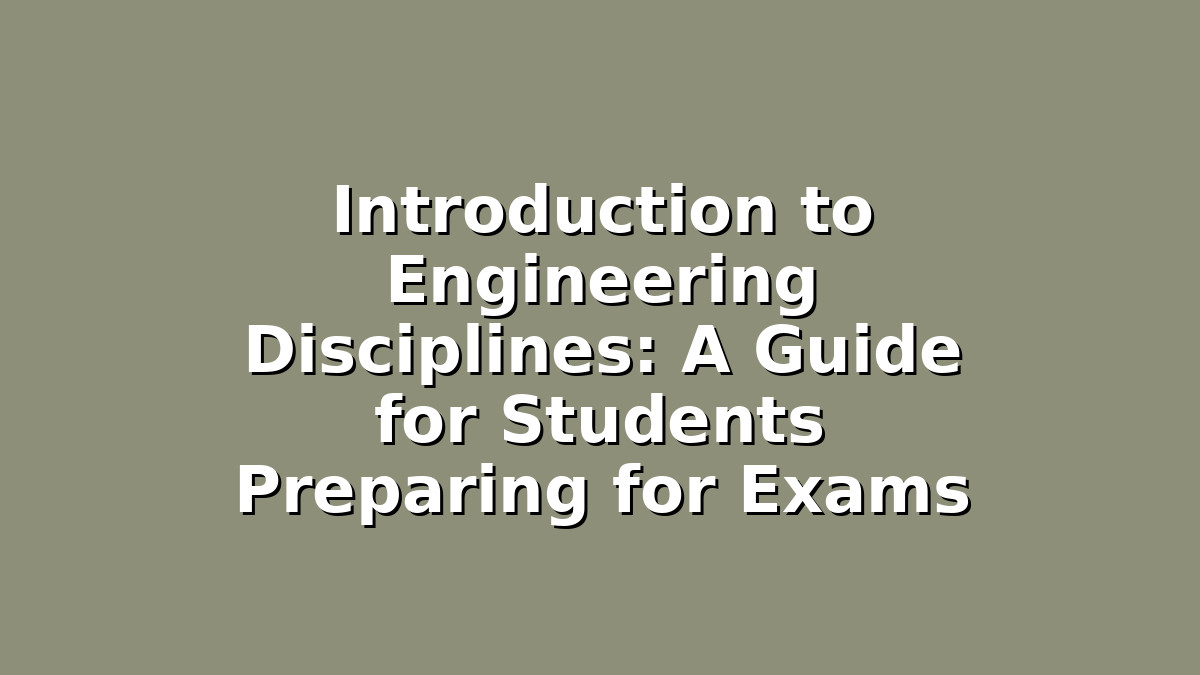Choosing to pursue engineering is a commendable decision that opens the door to countless career opportunities. Whether you are a high school student preparing for entrance exams, a college student gearing up for semester tests, or someone considering switching to an engineering field, understanding the different engineering disciplines is essential. This knowledge not only helps you make informed decisions about your studies but also aligns your efforts with your interests and career goals. In this article, we will explore the most common engineering disciplines, discuss effective study strategies for each, and provide tips to help you excel in your exams and beyond.
Understanding the Core Engineering Disciplines
Engineering is a broad field that encompasses various branches, each focusing on different aspects of technology, science, and problem-solving. Familiarizing yourself with these disciplines will give you a clearer picture of what to expect in your coursework and help you tailor your study habits accordingly.
1. Mechanical Engineering
Mechanical engineering is one of the oldest and most versatile engineering fields. It deals with the design, analysis, manufacturing, and maintenance of mechanical systems. This discipline covers topics such as thermodynamics, mechanics, fluid dynamics, material science, and robotics. Mechanical engineers work on projects ranging from engines and HVAC systems to robotics and automation.
Study Tips for Mechanical Engineering Students:
– Master the Fundamentals: Focus on understanding core concepts like Newtonian mechanics, energy conservation, and thermodynamics. These principles form the basis for advanced topics.
– Practice Problem-Solving: Mechanical engineering involves complex calculations and design problems. Dedicate time to solving problems from textbooks and previous exams to strengthen your analytical skills.
– Use Visual Aids: Diagrams, flowcharts, and CAD software can help you visualize mechanical systems better. Incorporate these tools into your study routine for greater comprehension.
– Group Study: Working with peers on design problems or simulations can enhance learning and expose you to different perspectives.
2. Electrical Engineering
Electrical engineering focuses on the study and application of electricity, electronics, and electromagnetism. It covers areas like circuit theory, signal processing, control systems, telecommunications, and power generation. Electrical engineers design and maintain electrical equipment, from small microchips to large power grids.
Study Tips for Electrical Engineering Students:
– Strengthen Math Skills: Electrical engineering relies heavily on calculus, linear algebra, and differential equations. A solid math foundation will ease your understanding of circuits and signals.
– Simulate Circuits: Use software tools like MATLAB, Multisim, or LTspice to simulate and analyze circuits. Visualization helps in grasping complex concepts more effectively.
– Focus on Practical Applications: Try to relate theoretical knowledge to real-world applications, such as how electronic devices function or how power is distributed. This approach makes studying more engaging and meaningful.
– Regular Revision: Electrical engineering topics can be conceptually dense. Periodic review sessions will reinforce learning and improve recall during exams.
3. Civil Engineering
Civil engineering involves the design, construction, and maintenance of infrastructure such as roads, bridges, buildings, dams, and water supply systems. This discipline combines knowledge of materials science, structural analysis, geotechnics, and environmental engineering to create safe and sustainable structures.
Study Tips for Civil Engineering Students:
– Understand Concepts Thoroughly: Structural analysis and material properties are critical in civil engineering. Ensure you comprehend the principles rather than just memorize formulas.
– Practice Drawing and Sketching: Drawing plans and diagrams is a vital skill in civil engineering. Practice sketching structures and reading blueprints to enhance your spatial understanding.
– Use Practical Examples: Visit construction sites or watch documentaries about infrastructure projects to see engineering concepts in action. Real-world contexts help deepen understanding.
– Organize Study Material: Civil engineering covers diverse topics. Create clear, categorized notes to access information quickly during exam preparation.
General Study Strategies for Engineering Students
Regardless of your specific discipline, certain study habits can maximize your learning efficiency and exam performance.
– Create a Study Schedule: Engineering syllabi are often dense and challenging. Break down your study time into manageable chunks, focusing on one topic at a time to avoid feeling overwhelmed.
– Active Learning: Instead of passively reading textbooks, engage actively by summarizing information, teaching concepts to a peer, or creating flashcards. This approach improves retention and understanding.
– Solve Past Exam Papers: Practicing previous years’ question papers familiarizes you with exam patterns and time management. It also helps identify weak areas for targeted revision.
– Maintain a Healthy Routine: Balanced nutrition, adequate sleep, and regular breaks enhance cognitive function. Avoid burnout by incorporating physical activity and relaxation into your daily routine.
– Seek Help When Needed: Don’t hesitate to ask teachers, mentors, or fellow students for clarification if you struggle with a topic. Online forums and study groups can also provide valuable support.
Staying Motivated and Focused
Engineering studies can be demanding, but staying motivated is crucial for success. Set clear goals, such as mastering a difficult topic or achieving a particular grade, and reward yourself when you meet them. Visualize your future career and the impact you want to make as an engineer. Remember that every challenge is an opportunity to grow.
Furthermore, cultivate a growth mindset by viewing mistakes as learning experiences instead of failures. Celebrate small victories and keep reminding yourself why you chose engineering in the first place. Surround yourself with positive influences and maintain a balance between academic and personal life.
Conclusion
Embarking on the journey of engineering requires dedication, curiosity, and effective study habits. By understanding the different engineering disciplines—mechanical, electrical, and civil—you can tailor your preparation to suit your interests and strengths. Implementing structured study strategies, practicing consistently, and maintaining your motivation will help you excel in your exams and build a solid foundation for your engineering career.
Remember, engineering is not just about equations and formulas; it’s about solving real-world problems and creating innovations that improve lives. Keep your passion alive, stay disciplined, and embrace the learning process. Success is within your reach!

Responses